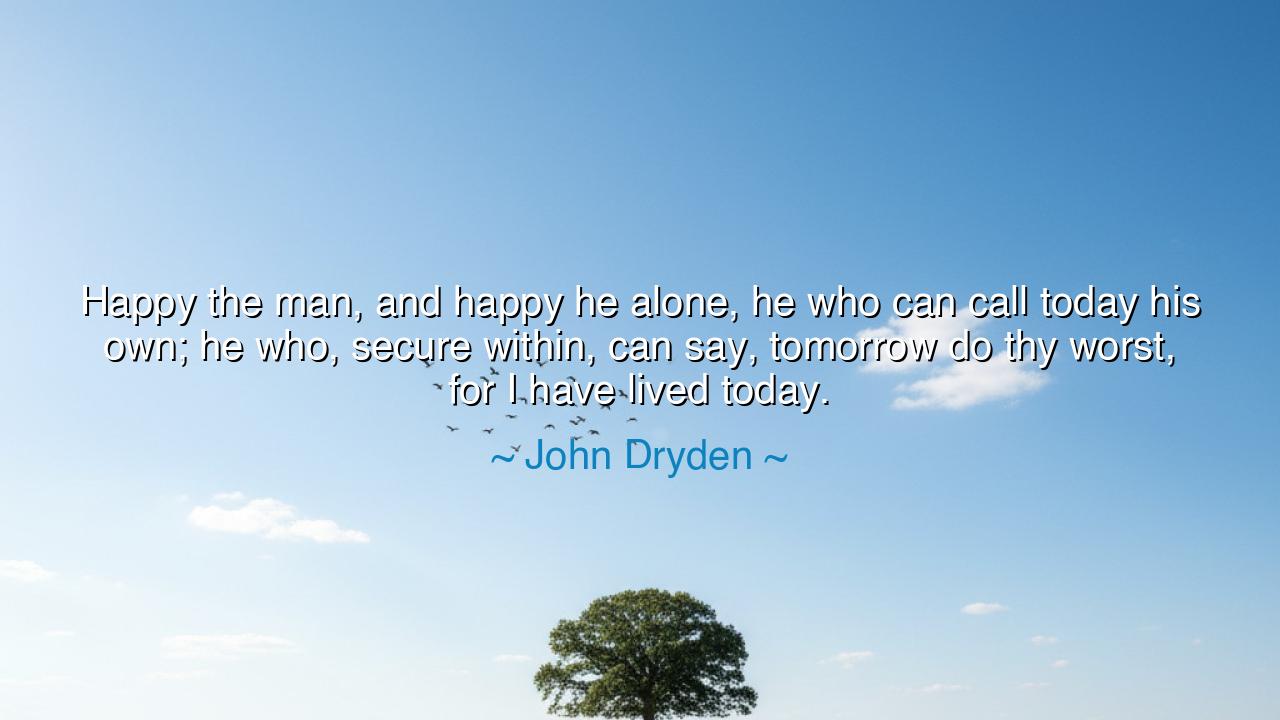
Happy the man, and happy he alone, he who can call today his own;
Happy the man, and happy he alone, he who can call today his own; he who, secure within, can say, tomorrow do thy worst, for I have lived today.






“Happy the man, and happy he alone, he who can call today his own; he who, secure within, can say, tomorrow do thy worst, for I have lived today.” — thus wrote John Dryden, the great poet of England’s Restoration age, whose words echo like a hymn to the timeless soul. In this verse, Dryden captures the deepest yearning of humanity — the desire not merely to exist, but to live so fully in the present that no future storm can steal our peace. His lines are not merely poetry; they are philosophy. They remind us that true happiness is not found in possession or promise, but in presence — in the mastery of the moment we now hold in our hands.
Dryden wrote in an age of upheaval — a time when kings fell, loyalties shifted, and the world seemed to move on tides of uncertainty. In such an age, the poet sought what all wise men seek when the world trembles: an anchor within. His vision of the “happy man” is not one of wealth or comfort, but of inner sovereignty. To “call today his own” is to possess the one thing no fortune, no ruler, no fate can take — the contentment of a heart at peace with itself. The man who can say, “Tomorrow, do thy worst,” is not reckless; he is free, for he has learned to live so completely in the now that no threat of loss can diminish what he already holds.
This teaching is ancient as time itself. The Stoic philosophers — Seneca, Epictetus, and Marcus Aurelius — taught that the wise man lives each day as if it were his last, finding completeness in every sunrise. “Begin to live at once,” Seneca wrote, “and count each separate day as a separate life.” Dryden’s lines are the poetic echo of that wisdom. The man who has lived fully today fears neither death nor disappointment, because he has already tasted the fullness of existence. Each moment well-lived is eternity in miniature, and the man who grasps this truth stands unshaken before the shifting hours of life.
Consider, for a moment, the life of Nelson Mandela. For twenty-seven years, he was imprisoned in a small cell, robbed of freedom and comfort. Yet he learned, within those walls, to live one day at a time — to rise each morning with discipline and hope. When he emerged, he bore no bitterness. He had mastered the art Dryden describes: to live secure within, to own his day even when the world denied him everything else. Such a man could say, as Dryden’s poem declares, “Tomorrow do thy worst,” for even in chains, he had lived truly.
The beauty of Dryden’s vision lies in its humility. It does not call for grand achievement, nor endless striving. It asks only that we be awake to the present, that we find meaning not in what may come, but in what already is. The modern soul, restless and hurried, forever chases a tomorrow that never arrives. We postpone joy, we defer peace, we wait for the perfect hour. But happiness, Dryden tells us, is a guest that visits only those who open the door now. To live today as one’s own is to stop bargaining with time and to claim the moment as sacred.
The secure heart — that fortress Dryden speaks of — is not built by circumstance but by perspective. It is the heart that knows how to rejoice in the smallest blessings: the warmth of sunlight, the sound of laughter, the satisfaction of honest labor. It is the heart that measures wealth not by accumulation, but by gratitude. When we cultivate this inner steadiness, tomorrow loses its power to frighten us. The storms may come, but they cannot touch what is whole within. For as Dryden writes, the man who lives today well has already lived enough to meet any dawn without regret.
Lesson: Do not wait for tomorrow to begin your life. Claim today as your own. Rise each morning with the resolve to live it fully — to love, to work, to notice, to be present. When you eat, taste deeply; when you speak, mean your words; when you rest, rest without guilt. Let no day pass as an echo of the one before. For when you live in this way, you gather a quiet strength that no loss can undo. Tomorrow may bring hardship, but you will meet it calmly, knowing that you have already lived what is eternal — the fullness of one irreplaceable day.
Thus, John Dryden’s words resound across centuries as a timeless call to awaken. They remind us that life is not measured in years or plans, but in the living pulse of a single, conscious moment. The man who can look upon the setting sun and say, “I have lived today,” has conquered both time and fear. For such a man, happiness is not a dream deferred — it is the very light of his being, shining in the eternal now.






AAdministratorAdministrator
Welcome, honored guests. Please leave a comment, we will respond soon